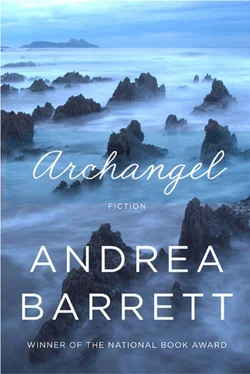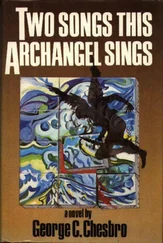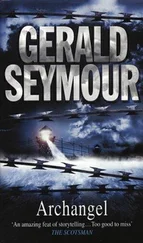Steadily, Sam and his companions rowed toward the Norwegian tanker Knute Nelson , which, in the light of occasional flares, popped sporadically out of the darkness. A little string of emptied lifeboats tossed in the swell beside the tanker, the boat closest to the stern still packed with people. Some grabbed at rope ladders while the bosun’s chair went up and down, hoisting those not agile enough to climb until, in the grip of a heavy woman who pushed off too vigorously, it overturned and left her suspended upside down. The crew struggled to retrieve her, but before they were done another boat nudged in behind the one still being emptied.
The man rowing next to Sam muttered, “They should stand out, that’s dangerous,” and when Sam drew his anxious gaze away from the faces he was searching, he could see how little space separated the last boat in line from the tanker’s huge propellers. He turned back to his oars. The sea was rough, the boat’s seams were leaking, many of his fellow passengers were wounded or seasick or both, and Sam was working so hard to keep their boat steady that he failed to see exactly what happened a few minutes later. By the time he heard the screams, the broken lifeboat, impaled on one of the propeller blades, was already rising into the air.
“Row!” said the seaman in charge of Sam’s boat. “Row, row, row, row!”
Sam, the tallest but not the strongest of those at the oars (he was out of shape), lost his grip and banged into the man beside him, who shouted at him; then all of them were shouting at each other while women wailed and children cried. Unbearable to think about what must have happened to those drawn into the propeller. The boat sped into the darkness, headed, once the assistant purser spotted it, toward an enormous, brightly lit motor yacht that had appeared from another direction. Before they were close enough to hail her, Sam saw two lifeboats tangle at her stern, one crowding the other under the angled counter — the swell had increased, making everything more difficult — which, after rising unusually high, crashed down on the gunwale of the inner boat and tipped it over. Suddenly, struggling figures, too small to identify, also dotted the water.
That was enough for the seaman in charge; Sam’s boat pulled away until it was clear of everyone. “Let’s wait,” the seaman said, “until sunrise, when we can see more clearly what we’re doing.” The swell grew heavier; dawn finally broke and three British destroyers arrived. The little boy whose mother was wearing Sam’s life belt pointed at them, smiled for the first time since the ship had been hit, and said, “Ring around the rosy!” Sam couldn’t see what the little boy meant, and then he could: two of the ships were racing after each other, herding within an enormous circle the remaining lifeboats, the tanker, the white yacht, and the third destroyer, which was plucking boatloads of survivors from the water. Twice, he thought it was turning their way, but each time it moved toward another, even more crowded boat.
The sky was red and then pink and then blue; Sam’s hands were numb; he hadn’t been able to feel his feet for hours. Once or twice he either fell asleep or passed out. Once, he lifted his head just in time to see an old woman in a lifeboat not far away leap toward a lowered rope ladder and miss, slipping into the narrow space between the boat and the destroyer’s hull; the boat rose on a swell and the space disappeared. He was barely conscious when, in the middle of the morning, a U.S. merchant ship arrived, cleaned out one boat before taking in a crowd transferred from the motor yacht, and then waved over the boat Sam was in.
The injured and frail went up in a bosun’s chair, but Sam, jolted awake by the prospect of safety, scrambled up a rope ladder with the other men. A person reached out for him, grabbed his arm, and heaved him over the side — not a stranger, not a sailor, but someone Sam knew: Duncan Finch. Part of him wanted to jump back in the water. Duncan, here? But there was the ship’s name, City of Flint , mocking him from the smokestack.
“You’re all right!” Duncan shouted as Sam dropped onto the deck. “Are you hurt?”
Sam flexed his elbow, which he’d cracked on a thwart but which still seemed to work, and then inspected his shin, where all the blood appeared to be coming from one long scrape. “Nothing serious,” he said.
Duncan pulled him toward a dry corner. “Is anyone else with you?”
Anyone, he meant, from the meeting; they’d been at an international genetics congress in Edinburgh, cut short by the situation. Sam shook his head. Families had been broken apart, siblings had ended up in different boats, friends had been randomly assorted: where was Axel? Eight other geneticists had been on the Athenia with Sam. One by one, in the thick, dark smoke, they’d climbed into lifeboats, dropped down to the water, and then disappeared.
Duncan said, with apparent enthusiasm, “But at least you’re here. You’re safe.”
Omitting, Sam thought, the fact that on their last day in Edinburgh, Duncan had asked Sam grudgingly, and only after Sam had already made his own arrangements, to join the small group he’d finagled aboard this American freighter loaded with wool and Scotch whisky.
“I did warn you,” Duncan added now. Still, after eighteen years of annoying Sam, unable to rein in his red-faced, bullying self. “I warned you not to take passage on a British ship.”
Anyone else would have understood how few choices existed. Sam’s booked passage had been canceled, the other ships were quickly commandeered, and on September 1, as he boarded the Athenia in Glasgow, it had still seemed likely that they’d get away safely. They’d had to pick up passengers in Belfast and then more in Liverpool, both ports packed with Americans and Canadians trying to get home, but by the afternoon of September 2 the ship was heading north up the Irish Sea, rounding the coast early on the morning of September 3. By the time the declaration of war was radioed, they’d almost cleared the most dangerous territory, their ship overbooked but still comfortable and, Sam had thought with a twinge of pleasure, less crowded than Duncan’s. Before Duncan left, not only his handful of stranded friends but also a group of college girls caught midway through a European tour had been stuffed into the City of Flint , making thirty instead of the normal five or six passengers. Now it bulged with another two hundred people, some freezing and still in shock, and among them—
“Is Axel here?” he asked.
Duncan turned, reached back to steady an elderly woman coming over the railing, and then pointed her toward a man who was giving out fresh water. “Of course not,” he said, inspecting Sam more closely. “Did you hit your head?”
For Duncan, Sam realized, Axel was still in Edinburgh, where he’d stayed to visit a friend despite Duncan’s frantic urging that he board the City of Flint . When the situation grew so dangerous that Axel’s friend cut the visit short and delivered him to the Glasgow docks, Duncan had already been at sea.
“He was with me,” Sam said. Two teenage boys tumbled onto the deck, their hair matted with oil; a girl in a tidy jacket rushed over to them. “The Athenia was the only ship that had a berth.” In another situation he would have enjoyed seeing the color drain from Duncan’s cheeks.
“He wasn’t .”
“He was,” Sam said. “We were eating dinner with that couple from Minnesota when we were hit.” One of what should have been many meals; what luck, he’d thought, to have Axel aboard! An unexpected benefit of letting Duncan sail without him. They might walk the decks, share quiet conversations, sit side by side in reclining chairs, and repair what had gone wrong in Edinburgh. At the dock, the sight of Axel’s battered gray hat and unmistakable nose had suddenly made everything broken and ruined seem hopeful again.
Читать дальше












